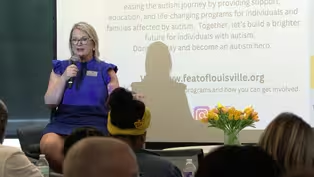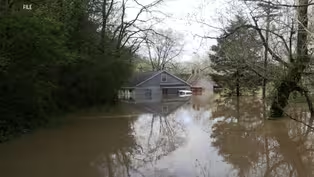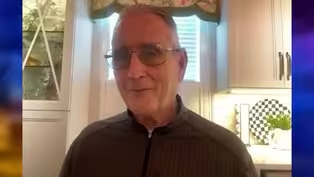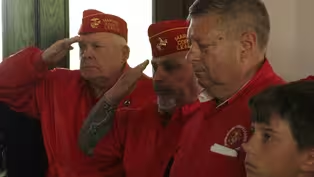
Actors Help NKU Students Prepare for Real-Life Scenarios
Clip: Season 3 Episode 238 | 4m 28sVideo has Closed Captions
NKU's Simulation Center uses actors to help students in the health field prepare for real-life.
Northern Kentucky University's Simulation Center uses actors to help students in the health field prepare for real-life scenarios in their jobs after college. Kentucky Education spoke with the director of the simulation center and an actor to see why this method helps.
Problems playing video? | Closed Captioning Feedback
Problems playing video? | Closed Captioning Feedback
Kentucky Edition is a local public television program presented by KET

Actors Help NKU Students Prepare for Real-Life Scenarios
Clip: Season 3 Episode 238 | 4m 28sVideo has Closed Captions
Northern Kentucky University's Simulation Center uses actors to help students in the health field prepare for real-life scenarios in their jobs after college. Kentucky Education spoke with the director of the simulation center and an actor to see why this method helps.
Problems playing video? | Closed Captioning Feedback
How to Watch Kentucky Edition
Kentucky Edition is available to stream on pbs.org and the free PBS App, available on iPhone, Apple TV, Android TV, Android smartphones, Amazon Fire TV, Amazon Fire Tablet, Roku, Samsung Smart TV, and Vizio.
Providing Support for PBS.org
Learn Moreabout PBS online sponsorshipNorthern Kentucky University Simulation Center uses actors to help students in the health field prepare for real life scenarios in their jobs after college.
We spoke to the director of the simulation center and an actor to see why this method helps.
More on that in tonight's Education Matters reports.
There's a lot of things that standardize our standardize.
Actors and actresses can do that.
Mannequins can't.
You know, we can put students into a situation and ask them to perform.
We call it kind of like hard skills and soft skills.
So the hard skills are those things that you typically think of when you think of what a nurse does.
So putting in IVs, performing different types of interventions, taking vital signs.
You can do those on a mannequin.
It's a little bit harder to develop those communication skills, or what we call the soft skills with the mannequins.
So we use our actors and actresses to help them develop those communication skills empathy, compassion, and also to learn to be able to do those hard skills while still communicating so that they get used to doing and talking at the same time.
I've been here for about three years, but total.
I've been a standardized patient at different colleges for about ten.
So I'm an actor and I'm also an improviser, and both of those roles really lend themselves very nicely to this kind of work.
But then specifically with this, it's really interesting to have a situation where I impact real world change.
So that was really kind of exciting.
And, my favorite part about it is I say that the doctors do the doctoring, but I do the humor, so I help them be better humans.
Yeah.
Like we do a lot of, airway scenarios.
So this might be distress.
We could do emergency.
We could do a cold situation.
We do a lot, communication simulation, mental health issues.
I'm talking about that.
We would do, more skill based.
So medications, administering safe medication, interprofessional communication.
So usually one simulation and has a combination of quite a few objectives that, rely on things that the students will see out in practice, whether it's nursing, respiratory care, social work, counseling, exercise science, nursing, this desire.
So it really just depends on the, discipline and who's here.
They're usually fairly short, no longer than like ten minutes.
And it's just to kind of get them to practice in a low risk gaming strategy setting.
When I first started, I had very, very little medical knowledge.
I was actually asking questions because I didn't know.
And I feel like that is true to life.
And, being able to have that experience was really valuable, helping the students because they are around it all of the time, and sometimes their medical brain is like, oh yeah, this is very common.
But for a patient, they they don't know what is coming.
They don't know what is normal.
So being able to guide the patients in that way is really helpful.
And that was really nice at the beginning.
And now because I have that foundational building, it's really helpful for me to be able to guide them in that way and say, oh, well, you said things in with medical jargon and that was really scary for me.
Or you, you might have gotten the medical answer right, but did I understand it further?
This simulation has a tendency to cause some anxiety because they're practicing in an environment that they're, you know, not sure of the situation.
I have a group of 12 students, so two are going to go in.
The rest of them are going to sit in a debrief space and watch the sim live.
So they will be able to watch the, students how they perform, and then they will talk and debrief about some of the things the observers notice, some of the things that the nurses were noticing at the bedside, the students simulated experience is force you to connect, and they allow you to connect in ways that are safe and allow you to stop.
Like, it's not like the train has left the station and you're not allowed to go.
I don't know how to do this, and I definitely feel like the world could use a lot more of like, I don't know how to do this, and that's okay.
We're going to figure it out.
And that's what standardized patient allows you to do.
Neat concept.
The simulation center currently has about 10 to 15 actors that rotate through different medical scenarios.
Creating Autism Friendly Businesses
Video has Closed Captions
Clip: S3 Ep238 | 3m 13s | Non-profit FEAT educates, trains groups to better respond to autistic individuals. (3m 13s)
Disaster Aid Approved For Counties Affected by April Flooding
Video has Closed Captions
Clip: S3 Ep238 | 34s | President Trump approved Kentucky's request on Friday. (34s)
KY Lawmaker Pushes for REAL ID Delay
Video has Closed Captions
Clip: S3 Ep238 | 1m 36s | State Sen. Jimmy Higdon called his request a "Hail Mary." (1m 36s)
KY Marine Corps Veterans Honor Legendary Serviceman
Video has Closed Captions
Clip: S3 Ep238 | 2m 28s | Lt. O'Bannon was the first American to raise a U.S. flag over foreign soil during war time. (2m 28s)
Providing Support for PBS.org
Learn Moreabout PBS online sponsorship
- News and Public Affairs

Top journalists deliver compelling original analysis of the hour's headlines.

- News and Public Affairs

FRONTLINE is investigative journalism that questions, explains and changes our world.












Support for PBS provided by:
Kentucky Edition is a local public television program presented by KET



